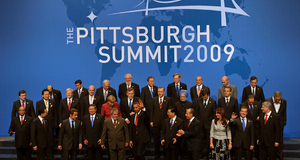Featured Opinion:Understanding the Implications of a Global Village
By
2009, Vol. 1 No. 11 | pg. 1/1 Imagine the vast spectrum of all the cultures in the world. Listen to the music—from the gentle drum beats of Africa, to the melodic didgeridoo of Australia, to the scream of the electric guitar. Taste the curry from India, the coconut milk from Thailand, the cheeseburger from the United States. Now imagine that all these cultures are compressed into one super-culture. The individually unique music is now a raucous cacophony. The individually savory flavors are a muddled sludge. All the countries in the world are united under one government and one religion. Communists follow the same rules as those previously under a democracy. Muslims and Christians live by the same religious standards. How would we deal with that? In light of rapidly accelerating globalization and expansion of technology, it becomes relevant to discuss the implications of a potential overarching culture with respect to the potential clashing of cultures. The issue of cultural identity is certainly not a new one. When McLuhan presented his idea of a “global village” however, his concept raised several distinct social problems. As June Johnson, author of Global Issues, Local Arguments, states, “The idea of the world’s cultures drawn together in a global village raises questions about equal representation, reciprocal sharing, enriched diversity, and mutual understanding” (192). More than ever, examples of cultural globalization can be seen in our everyday lives. The Internet has exploded with a boom in technology, providing individuals from all over the world the opportunity to communicate instantly with each other. Instant messenger, Facebook, Myspace and various online forums are examples of this instant communication. In order to examine these complex problems, we must carefully consider examples of each of the potential outcomes Johnson refers to. A main concern held by those wary of the effects of cultural globalization is that American media and culture have a negative impact on other cultures around the world. In other words, countries with more economic influence will eventually control the cultural standards by which the rest of the world will have to live. John Harris, a British journalist and author, describes an American rock performance in Brazil and how AOL had sponsored the event: “Rock in Rio was sponsored by AOL…Lest anyone fear that AOL’s arrival represented any kind of online imperialism, their logo had been sprayed in the heartwarmingly Brazilian color scheme of green and yellow” (237). Harris goes on to describe how American media giants are taking advantage of globalization to self promote while homogenizing musical diversity. America is blamed mostly for its alleged imposition of culture and mass media; however, other developed countries in China and Europe are also at fault as they reinforce American Culture globally. A primary example used to fortify this assertion is MTV and Hollywood, both pervasive American media networks that extend their influences far outside of American borders, as Johnson notes, “In 2004 MTV calculated that around ‘eighty percent of its viewership is now outside the United States’” (192). MTV claims to adapt its programming accordingly to each country and to attempt to spread a mix of ethnic programming from country to country. These MTV branches include MTV France, Italy, Spain, Japan, Brazil, Latin America, Korea, India and Canada. If these networks accurately depict the cultures of each host country, then MTV has caught on to the globalization trend. (1) If it is consciously endorsing a global diffusion of diverse music media, then it is a huge player in the technological expansion of cultural boundaries. The problem with this permeation of the music market globally, however, is that the economic power of MTV as an American company supercedes the alleged diffusion of cultures that it claims to inspire. Related to the idea of cultural domination is perhaps a more essential issue. As this shift towards cultural sharing and overlapping ensues, how does globalization affect cultural diversity? Critics and activists adamantly argue this point. Johnson presents a summary of their argument when she writes, “Some assert that cultural contact is creating uniformity, standardization, homogenization—a global monoculture that is sterile, dull, and artificial” (193). A prime example of this frustration is the proliferation of American fast food restaurant chains in foreign countries. The excitement of visiting another country is easily soured upon stepping out of the airplane only to see American fast food chain restaurants. McDonalds, Burger King, Pizza Hut and KFC taint the cities of even former Eastern block countries such as Hungary. A more serious implication of this permeation of cultural standards is addressed by anthropologists and linguists, who argue that “…language is bound to culture and that culture is connected to the deep values and structures that hold societies together” (Johnson 194). The potential loss of less spoken languages is a serious concern. An online language database “Languages of the World” dedicates itself to promoting awareness and understanding about languages, offering self language competence assessments and lists of languages that are considered endangered. According to the website, “The world faces enormous challenges in maintaining language diversity. Of the more than 6,912 languages, half may be in danger of disappearing in the next several decades” (Endangered Languages). Losing these languages poses serious cultural risks because we lose aspects of the smaller cultures that are now unable to articulate their beliefs and knowledge as a result of the extinction of their language. With this loss, not only does our world become more mundane, but we also run the more serious risk of losing some cultures forever. This is certainly worth considering in our discussion of cultural boundaries. In contrast, however, other stakeholders in the discussion including “…proponents of free trade, corporate leaders, some cultural analysts, and many citizens around the world applaud the opportunity and cross fertilization engendered by globalization’s stepped-up cultural contact and sharing” (Johnson 194). They have even gone so far as to state that the world has “become a richly stocked ‘bazaar,’ not a monoculture” (Johnson 194). They view globalization and cultural sharing as a benefit because it potentially allows all citizens of the world to enjoy the aspects of each others’ cultures. One culture does not need to be drastically changed for the worse in order to enjoy the rich diversity of another. Philippe Legrain, the chief economist of Britain and a former advisor in the World Trade Organization, is adamant that globalization is a positive cultural trend. He states, “The beauty of globalization is that it can free people from the tyranny of geography…. That we are increasingly free to choose our cultural experiences enriches our lives immeasurably” (210). These people also address the phenomenon of Westernization, or expansion of products and customs from western developed countries, as not necessarily an imposition of culture, but an opportunity for less developed countries to incorporate their own culture with Western culture. They justify this assertion by pointing to the fact that the United States is composed of a melting pot of cultures to begin with. Our population is comprised of immigrants from Europe and other developing countries whose beliefs have been “integrated” into our culture as a whole. According to Johnson, “Using words like integration and cultural fusion, these analysts claim that the mixing of cultures is inevitable, healthy, and enriching” (195). To these people, globalization is not an evil change being thrust upon society. It is a natural evolution and progression of how people interact with each other given advanced capabilities to communicate. With enhanced communication, though, comes the inevitable realization that some nations are less financially capable of supporting their citizens than others. The harsh realities of poverty, starvation, disease and civil war are now made more evident to those who live in privileged countries. It would make sense, therefore, if individuals used the excuse to not help less fortunate people in the world because they were not aware of their suffering, they could no longer ignore the pain that exists outside their comfort zones. It frightens people to come to terms with suffering in the world. It also raises the question of exactly how much the suffering of other countries and the failing of their governments becomes our responsibility as an affluent nation. Approximately 12% of Americans are living in poverty, defined by the 2006 census as living below the poverty line of $20,614 for a family of four (Census). Shouldn’t the United States solve its own economic and socioeconomic problems before rushing off on a crusade to save all African children from hunger? These considerations need to be made and some sort of system established to ensure that countries that are economically able help to improve the standard of life in developing countries while maintaining prosperity for their own people. With increased responsibility to support impoverished countries comes the consideration that perhaps an enhanced system of interconnectedness between countries will lead to global cooperation and peace. The United Nations Educational, Scientific, and Cultural Organization (UNESCO) “…supports the idea that protecting cultural rights and diversity has the potential to promote peaceful international relations” (Johnson 195). This assertion does not specify, however, that supporting cultural identity in specific response to globalization will lead to peaceful relations between countries. It seems obvious that if all countries felt secure in the protection of their cultural beliefs in the world, we would live peacefully. It is naïve considering the current state of political foreign relations to imagine that as a world we could achieve a peaceful coexistence. It is idealistic to imagine a situation where cultures can meld together without losing their individuality while remaining peaceful about the compression of global culture. More likely a clashing of cultural ideals and values would ensue. Certain analysts have approached this conclusion: “…increased cultural contact frequently does not foster peace; instead it engenders resentment and antipathy” (Johnson 195). An example of this antipathy can easily be seen while examining world religions. In the Middle East, wars have been raging for centuries over religious ideologies. Meredith Small, a cultural anthropologist and author of Our Babies, Ourselves: How Biology and Culture Shape the Way We Parent, presents a more tangible example. She describes how cultural clashes emerge when studying parenting styles. She writes about a specific study involving Lebanese and Australian mothers whose cultures led them to parent in very different ways, and as a result feel resentful toward the mothers of the other culture. Small goes on to say, “In this and other studies of mothers-out-of-their-primary culture, it is not socioeconomic status or religion, or parental education that makes for a clash; it is ethnicity” (68). Since children play a significant role in all world cultures, it makes sense that each culture would have very different expectations and customs surrounding parenting. This small slice of cultural practice is representative of many other engrained cultural differences around the globe. Perhaps if existing cultures were not already set up to contradict each other, a peaceful threshold could be reached. How can we process this vast field of information about “equal representation, reciprocal sharing, enriched diversity and mutual understanding” in a globally useful way? Whether the world is shrinking, expanding, or remaining the same metaphorical size, it is clear that how we communicate across physical and cultural boundaries is changing at an accelerated rate. With these changes comes a responsibility, as humans, to consider the implications of our shifting realities. Without an objective and inclusive analysis of these issues, we will be unprepared for the rollercoaster of cultural mayhem that could inevitably ensue. If we are in fact becoming a global village, will we be able to reach some sort of consensus about how these issues should be addressed in order to benefit all members of our village equally? If we cannot determine respectful cultural boundaries in the simplest manner with regards to language, economy, and basic means of survival, it is presumptuous to assume that we can identify as a global village at all. References"Endangered Languages." Languages of the World. 29 Nov. 2007. Suggested Reading from Inquiries Journal
Inquiries Journal provides undergraduate and graduate students around the world a platform for the wide dissemination of academic work over a range of core disciplines. Representing the work of students from hundreds of institutions around the globe, Inquiries Journal's large database of academic articles is completely free. Learn more | Blog | Submit Latest in Opinion |


















